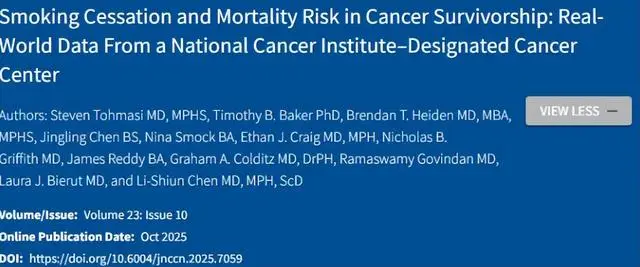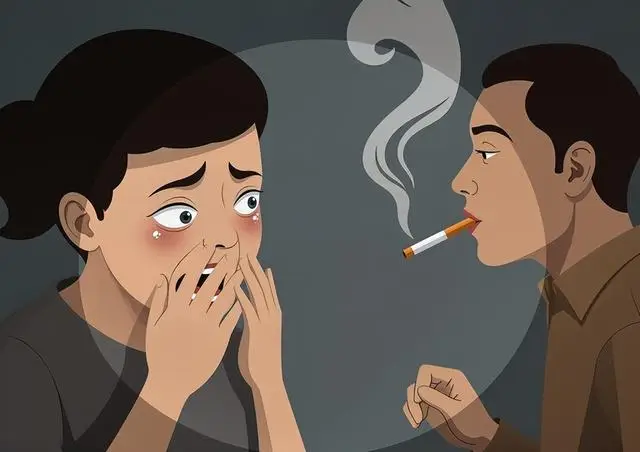"I already have cancer, so what's the point of quitting?"
Many patients may have this thought when asked to quit smoking.
However, a recent study by a University of Washington research team shows that even if smoking cessation is initiated after a cancer diagnosis, it can still significantly reduce a patient's risk of death.

I. Data Shocks
In October 2025, a study published in the Journal of the National Comprehensive Cancer Network directly challenged popular belief with hard data.
Analyzing clinical data from over 130,000 cancer patients, a University of Washington research team found that even if smoking cessation is initiated after a cancer diagnosis, the patient's risk of death can still be significantly reduced by 97%, and the two-year survival rate can be increased from 74.7% to 85.1%.
From a medical perspective, this conclusion is truly revolutionary.

For example, while doctors previously knew smoking was harmful, they often prioritized quitting after chemotherapy, radiation therapy, and surgery. However, this study has found that among patients undergoing surgery, those who continued to smoke afterward had a 4.41-fold higher risk of death compared to those who quit during the surgery period.
This indirectly increases the likelihood of a cure, making surgery much more cost-effective than traditional treatments.
Who would have thought that the cheapest "anti-cancer strategy" would be quitting smoking?

Furthermore, this research is already impacting real-world outcomes.
Since the study's publication, the National Comprehensive Cancer Network has incorporated smoking cessation support into multiple cancer treatment guidelines, recommending that all cancer patients who smoke receive smoking cessation counseling and support.
Effective smoking cessation intervention strategies are also beginning to be developed.
The confidence they place in this study stems from the robust follow-up study that began in 2018.

During the two-year follow-up, the University of Washington research team employed rigorous research methods and controlled for potential confounding factors such as age, gender, cancer type, stage, and treatment regimen. The 13,282 study subjects encompassed a wide range of cancer types, ensuring the generalizability of the findings.
Finally, through rigorous statistical analysis, the study found that current smokers had a 35% higher risk of death than never-smokers, and even former smokers had a 13% increased risk.
The benefits of smoking cessation for cancer patients are well-supported by solid evidence.

Of particular note, among patients with advanced stage III/IV cancer, the risk of death for quitters was more than halved compared to that of continuing smokers.
This demonstrates that, regardless of the stage of cancer progression, quitting smoking is an effective, last-ditch measure.
However, systematically integrating smoking cessation support into routine oncology care remains a significant challenge.
II. Misconceptions
As early as August 2022, The Lancet warned that nearly half of global cancer deaths are linked to controllable factors such as smoking and alcohol, with smoking being the leading cause of death.
Yet, even with early warnings, a significant number of patients still choose to "give up" in clinical practice.
After all, "It's already advanced stage, so why bother smoking and dying?" This mindset is all too common.
Additionally, cancer patients often experience significant psychological stress, and smoking may become a way for them to cope with anxiety and depression.
Many patients feel, "I've smoked for decades, so even if I quit now, it won't stop the cancer cells." Some even use smoking as a "painkiller," believing it can alleviate treatment anxiety.
In these cases, even if they are told that quitting smoking will benefit their treatment, they won't care.

In fact, many patients are likely willing to spend hundreds of thousands of yuan on targeted drugs but are reluctant to give up cigarettes that cost just a few yuan a pack, even though the survival benefits of quitting smoking are more substantial than many other high-cost treatments.
However, precisely because of this, a shift in their mindset is urgent.
Study lead Professor Steven Tohmasi points out that this mindset is harmful, as data clearly shows that even for patients with advanced disease and a relatively poor prognosis, quitting smoking can still bring substantial survival benefits. Moreover, even from an economic perspective, the cost-effectiveness of smoking cessation interventions far surpasses traditional treatments, at least significantly more cost-effective than targeted drugs, which can cost tens of thousands of yuan.
The systematic integration of smoking cessation support into routine oncology care still faces significant challenges.
III. The Reality
The University of Washington study contains a heartbreaking set of data:
Even with the ELEVATE system, an intelligent system that automatically reminds doctors to prescribe nicotine replacement therapy and provides smoking cessation counseling, only 381 of the 1,725 smokers enrolled in 2018 successfully quit smoking after six months, a success rate of just over 22%.
It can be said that the methods for quitting smoking are still far from perfect.
Furthermore, even if the methods were perfected, the implementation of the interventions would be weak, making it difficult to achieve results.
After all, among patients with chronic diseases, the practice of "taking medication without controlling diet" is common, such as diabetic patients drinking milk tea while taking insulin, or hypertensive patients taking antihypertensive medication but still consuming high-fat and high-salt foods at every meal.
Some patients may even forget to take their medication.
Nicotine dependence is essentially a chronic condition. Sudden smoking cessation can lead to irritability, insomnia, and difficulty concentrating. Many hospitals lack dedicated psychological counseling for smoking cessation, leaving patients to simply "stubbornly" endure.
This means that even with doctors watching closely, some will inevitably disobey.
What's even more worthy of reflection is the medical system's "worship of technology."
Hospitals now readily invest in million-dollar radiotherapy equipment and develop exorbitantly priced anticancer drugs, but are unwilling to invest in smoking cessation intervention teams. Doctors can recite dozens of chemotherapy regimens but can't clearly explain the impact of nicotine on treatment.
The data is clear: Quitting smoking can double the survival rate of patients with advanced disease and reduce the risk of surgical mortality by 75%. Aren't these benefits more tangible than some "high-tech therapies"?

Ultimately, cancer treatment has never been about "hard-core technology." When patients are willing to give up smoking and doctors are willing to spend an extra ten minutes discussing smoking cessation, then the 97% risk reduction becomes more than just a number on paper. For cancer patients, the most precious "anti-cancer drug" may be the moment they put out their cigarette.

%20--%3e%3c!DOCTYPE%20svg%20PUBLIC%20'-//W3C//DTD%20SVG%201.1//EN'%20'http://www.w3.org/Graphics/SVG/1.1/DTD/svg11.dtd'%3e%3csvg%20version='1.1'%20id='图层_1'%20xmlns='http://www.w3.org/2000/svg'%20xmlns:xlink='http://www.w3.org/1999/xlink'%20x='0px'%20y='0px'%20width='256px'%20height='256px'%20viewBox='0%200%20256%20256'%20enable-background='new%200%200%20256%20256'%20xml:space='preserve'%3e%3cpath%20fill='%23FFFFFF'%20d='M194.597,24.009h35.292l-77.094,88.082l90.697,119.881h-71.021l-55.607-72.668L53.229,232.01H17.92%20l82.469-94.227L13.349,24.009h72.813l50.286,66.45l58.148-66.469V24.009z%20M182.217,210.889h19.566L75.538,44.014H54.583%20L182.217,210.889z'/%3e%3c/svg%3e)




